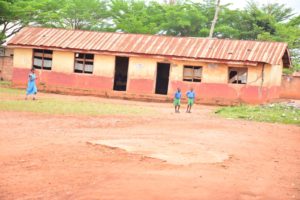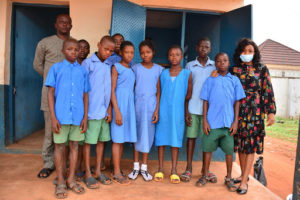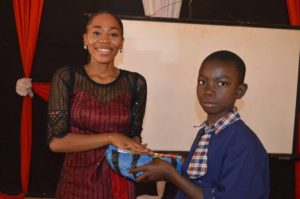Nigerian Undergraduate Tackles Street Hawking One Child At A Time
Some child hawkers in Kogi State, North-central Nigeria, are one step closer to getting better futures thanks to the work done by Hawkers Initiative, a programme by an undergraduate, Mary Abuh Ojonikoh.

In 2019, Mary Abuh Ojonikoh, during a short holiday at her aunt’s place in Ankpa, decided to help hawk some pepper and tomatoes as a way to increase dwindling sales made in the small shop. The experience changed her life and subsequently, the lives of others.
Selling around the town in Dekina Local Government Area (LGA), Kogi State, North-central Nigeria, the then 19-year-old Mary tolerated rude customers who spoke harshly or priced the goods ridiculously as she sold out tray after tray.
Then the day took an interesting turn. A man in a car called out and asked for peppers. He asked that she sell everything on the tray to him and bring more if she had, insisting that he would buy it all. Elated, Mary ran to get more peppers but when she got back, the man asked her to enter the car, follow him home so he could pay her.
“His statement still rings a bell in my head – ‘young lady, follow me home to collect money.’ How do you expect a young child to cope with the fact that someone wants to buy all her goods and she is asked to hop into the car to collect money at home?” Mary asked in an interview with HumAngle.
She refused to enter the car. Minutes later, still stunned, she turned to her cousin who had been hawking for a longer time and asked if this was a usual occurrence. The cousin nodded and Mary said it “hit me how many children have been sexually exploited or kidnapped while hawking.”
“What happens to a girl child hawking who is gullible, or a boy child who is without proper guidance? How about a child whose only hope of family survival is dependent on the sales made from hawking?” she asked.
These questions plagued her as she returned to school, leading her to start a programme called Hawkers Initiative in 2020. With it, she and several partners have worked to provide succour and education to street hawkers as well as expand their access to opportunities.

The International Labour Organisation (ILO) estimates that about 14 million children in Nigeria between the ages of five and 14 are involved in a form of economic activity, including hawking. Globally there are 168 million children involved in child labour. Of these, 59 million are from sub-Saharan Africa.
There have been several attempts by the federal and state governments to curb child street hawking but the trend persists. Recently, Kogi State, where Mary runs the Hawkers Initiative, has criminalised child hawking during school hours.
Wemi Jones, Kogi commissioner for education, science and technology, said any child found hawking during school hours will be taken into state custody.
Speaking at a stakeholder’s sensitisation meeting on March 18, Jones said the decision is in line with the recently-passed Kogi education law. The Kogi state house of assembly passed the bill into law in Sept. 2020.
The commissioner noted that such children will be kept with the state, while the parents or guardians will be expected to provide an explanation for the child’s absence in school.

Shifting realities
For a lot of the children interviewed by HumAngle in Kogi state, the prospect of going to school was not just hampered by hawking. It was a means of survival as their families could not afford their tuition in the first place.
Michael Samisu, a 12-year-old boy used to skip school so he could provide for his mother and younger siblings. The primary four pupil from Anyigba and his older brother would go to the farm to pluck cashews and mangoes during fruit season, sell the fruits, and hand the money to his mother. On some days, he would do the routine after school hours.
Samisu admitted to being a truant so he could sell fruits. According to him, he began to see differently when Hawkers Initiative visited his school and enlightened the pupils. He is working on a better arrangement where he only farms after school hours every day because his family needs the income.
Sometimes, he goes alone to cultivate, weed or tend the growing crops on his father’s land, especially during seasons when there are no fruits to sell. Farmlands in recent times have been scary zones for farmers because of attacks by criminal herders and ‘bandits.’
When asked what his aspirations for the future are, Samisu replied that he aspires to work with the Nigerian military when he finishes his university education; a dream he could not nurse months before.
This change in perspective and hope for a better future are some of the reasons the Hawkers Initiative leads a strong education campaign. For Mary, the inclusion of writing or school-related material in whatever the initiative does for the child-hawkers is to keep their thoughts on the positivity of a future outside hawking.
Yusuf Abdul, a 13-year-old primary five pupil shares the same optimism as Samisu and wants to be a naval officer someday. He told HumAngle that he became convinced of a future outside hawking because of the love extended by Hawkers Initiative.
According to him, he got textbooks, notebooks, and pens from the team, who also paid his fees during their visit to his school. Yusuf has been learning to repair fridges for about three years and describes himself as an expert who will soon get his freedom. He owes training fees and hopes to be able to cover them by graduation time from the programme.
“I am not scared of my future. I know I will be great and most importantly help many children like me when I grow up and become successful,” Yusuf said.
Joeretu Sani is another beneficiary who sees the prospect of a brighter future. The 13-year-old, who is in primary five, now goes to hawk only after school hours. Following two enlightenment programmes by Hawkers Initiative, her mother enrolled her on tailoring classes.
Joeretu also wants to become an accountant when she gets older. She believes she could sponsor her education and achieve this vision as long as she puts her best into learning tailoring well.
Moving forward

Mary, who is presently a final year student of Kogi State University, told HumAngle that the purpose of the Hawkers Initiative is to encourage child-hawkers to keep their dreams alive as they navigate their circumstances. According to her, the children need to believe that there is life beyond the streets.
“An average female child or teen hawker on the streets is walking around with tissues or rags in place of pads. I do not need billions of naira in my account to do my bit in making the world more humane. A notebook of 100 naira can go a long way in putting smiles on the face of someone. who knows, it could be the greatest need to keep that child needs in school at that material time. They also need clothes to make them look more presentable while they hawk, foodstuff, pads, and little needs arising,” she said.
The initiative also has programmes and talk shows that enlighten and sensitise the hawkers on sexual abuse and other forms of exploitations that might occur as they move on the streets.
Mary does not contend with the Kogi state government’s position on banning hawking during school hours, however, she feels the state and the country are not equipped for that at the moment, considering the rate of poverty in the land and “unrealistic governmental policies.”
“The overall long term goal is that children hawkers are not found on the streets anymore. But until we become a developed nation that has the capacity to achieve that, we would start with the little we can. We would no doubt get to the point someday when there would not be hawkers on the streets, but before we get there, how are the hawkers on the street fairing? ours is to try and improve as many hawkers’ lives as God grants us the means.”
“When you get to a society tomorrow and you ask ‘how come there are no children hawkers, but all in school?’ People should tell you of a societal awakening to the little needs of survival rather than just talks. That is our aim,” Mary added.

Support Our Journalism
There are millions of ordinary people affected by conflict in Africa whose stories are missing in the mainstream media. HumAngle is determined to tell those challenging and under-reported stories, hoping that the people impacted by these conflicts will find the safety and security they deserve.
To ensure that we continue to provide public service coverage, we have a small favour to ask you. We want you to be part of our journalistic endeavour by contributing a token to us.
Your donation will further promote a robust, free, and independent media.
Donate HereStay Closer To The Stories That Matter




